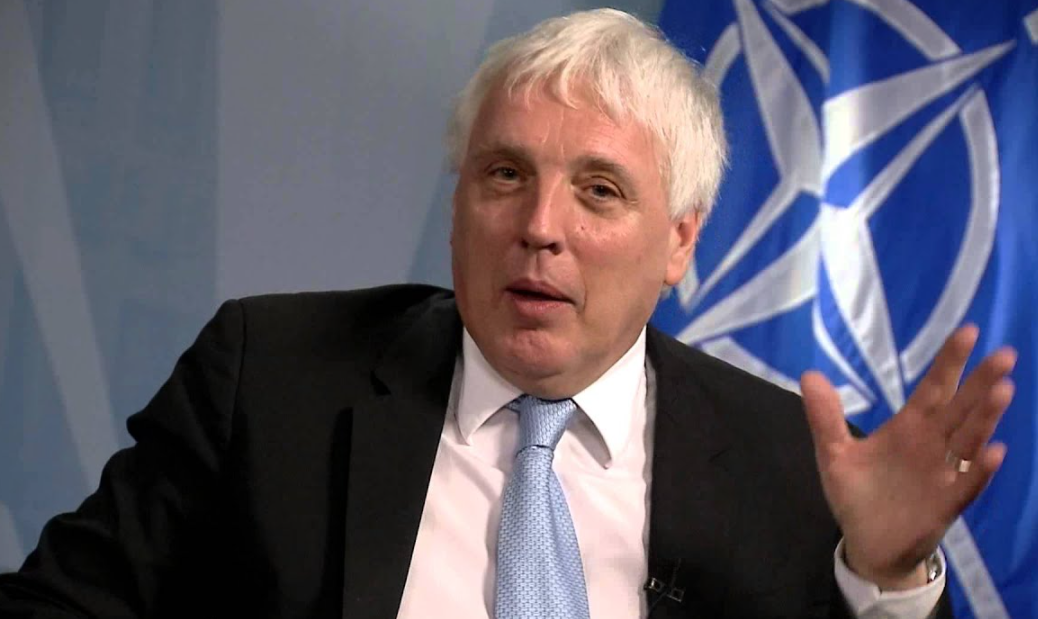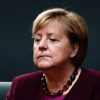In the days of occupation, war, genocide, Jamie Shea became the most credible voice that told the world about the suffering, massacres and systematic persecution of the people of Kosovo by the Serbian state. At that same time, Shea was the voice of the strongest military alliance and the voice of hope for the citizens of Kosovo. On the 22nd anniversary of NATO humanitarian intervention against the Serbian regime, Jamie Shea returns with an exclusive interview for Demokracia.com.
In this interview, Shea talks about the complex decision taken by NATO on March 24, 1999; Russia’s efforts to partition northern Kosovo, and its ground intervention plan.
Shea also talks about the issues that Kosovo is facing today. He is optimistic that the international community will be united as before, while he is convinced that the West has not turned its back on Kosovo.
Shea also talks about the role of the KLA in the fight for freedom of Kosovo, the Specialist Chambers and the emotional connection he has with Kosovo.
Demokracia.com: In the circumstances of occupation, war, genocide, NATO intervention for Albanians came late. For the west it came after all diplomatic efforts were exhausted. For opponents, the intervention should never have happened. How was this complex, sensitive and so decisive decision taken?
Jamie Shea: As your question rightly indicates, the NATO allies worked hard to achieve a negotiated, political solution to the crisis in Kosovo throughout 1998. Their aim was to convince Belgrade to restore to Kosovo the autonomy that it had had before Milosevic revoked it unilaterally in 1989. Also we demanded that Belgrade stop its campaign of violent repression of the Kosovar people that was not only a violation of their human rights but also inevitably leading to an escalation of the violence. At the negotiations in Rambouillet in France the Kosovars accepted the negotiated solution brokered by the international community; but Belgrade rejected it and clearly preferred to pursue the use of force and a solution on its terms only. So, to prevent more violence and a humanitarian disaster NATO began its military intervention in March 1999. Throughout, NATO wanted to keep to international law and to give Belgrade the chance of a peaceful solution, if it was prepared to take it. So, it would have been difficult for NATO to intervene earlier. At the same time NATO acted much faster in Kosovo than it had in Bosnia with the result that the conflict was much shorter and the loss of life considerably less. And to the critics of NATO’s intervention. I say: “what more credible alternative have you ever come up with to prevent massive violence and a high death toll in Kosovo in 1999?”
Demokracia.com: The world knew you as the spokesperson of NATO, but for us you were the voice telling the suffering, massacres, and systematic persecution of the people of Kosovo. Were you aware at the time that your press conferences turned into a source of hope for survival for two million Albanians?
Jamie Shea: No, I was not aware that people in Kosovo during the conflict were able to follow the NATO press briefings – and had found these helpful in maintaining hope during this incredibly stressful time. I only realised this when I visited Pristina with the NATO Secretary General in June 1999 and was able to meet Kosovars and ask them about their experiences. During the conflict we were addressing multiple audiences: public opinion in NATO countries, Belgrade and international partners in the United Nations. The biggest concern was that our own media and publics in the NATO countries would continue to support us until we achieved our objective of stopping the repression by Belgrade. This was not always easy and we had some difficult moments when the day to day NATO military operations did not always go as planned. So I am proud that the press briefings had the added value of helping the people of Kosovo to stay resilient. This was a real bonus.
Demokracia.com: What we call misinformation today, you have experienced in dealings with Serbian and Russian propaganda. How difficult was the fight to inform and protection against misinformation back then?
Jamie Shea: Back in those days the social media were in their infancy, and we had not yet experienced the highly resourced and sophisticated cyber-attacks, propaganda and disinformation campaigns that we have suffered over the last decade and which NATO calls hybrid warfare. Back in 1999, CNN and BBC World TV dominated the airwaves, and most people still accessed their news from the traditional media. So, I consider myself fortunate that the Kosovo press briefings took place in 1999 rather than 2019. Certainly, at that time I received my fair share of hate mail by post; but I shudder to think what would happen on the social media and Russian and Chinese state media and Twitter accounts if the Kosovo conflict was happening now. There would no doubt be an avalanche of hostile tweets, trolls and bots from the authoritarian states and their acolytes to try to discredit the value of democracy and liberalism and to deny the reality of the human rights abuses that undeniably occurred.
Demokracia.com: In 1999, it was not only Kosovo and Serbia at war, but also the credibility of the West was at stake. Looking from today’s “Zeitgeist” such unity is unimaginable today. What made you so united then and what makes you so divided today?
Jamie Shea: I am not so pessimistic that the West is divided today. NATO has responded vigorously to Russia’s illegal annexation of Crimea in 2014 and the EU and the US and many other countries have maintained sanctions against Moscow ever since. The allies intervened in Libya to stop Qaddafi committing a massacre against the population of Benghazi and have stayed together in Afghanistan and Iraq. The ISIS caliphate was defeated by an international coalition. Since 1999, Croatia, Slovenia, Romania, Bulgaria, Albania, Montenegro and North Macedonia have all joined NATO and I hope independent Kosovo will follow them before too long. The new Biden administration in the US is now working closely with the European allies and Biden has made strengthening alliances his top foreign policy priority. Would I like to see even more unity? Of course, but the overall picture is not too bad. We still pull together to face crises and that’s the main thing.
Demokracia.com: The bombings lasted longer than expected. Did NATO have a plan B for ground intervention?
Jamie Shea: It takes time for the limited and proportionate use of force to achieve a decisive impact as it was designed to punish the Milosevic machine of repression, not the Serb people. So, NATO had to give the air campaign and the accompanying diplomatic effort, led by former Finnish President, Maarti Ahtisaari, time to work before moving to Plan B. Fortunately, this combination of force and diplomacy worked by totally isolating Milosevic and making it clear to him that he would not be saved by divisions in the international community. I do not believe that NATO wanted to launch a land campaign if it could avoid it but, given the extent of Milosevic’s ethnic cleansing in Kosovo, I am convinced it would have done so had the air campaign not succeeded.
Demokracia.com: Were there any attempts, by the Russians, to separate Northern Kosovo, in 1999?
Jamie Shea: Indeed the Russians tried in June 1999 to establish a bridgehead in northern Kosovo. Perhaps Yeltsin was seeking something like a Republika Srpska north of the Ibar or simply a Russian military sector in order to counter NATO and EU influence in the region. But the Russian operation was amateurish and Hungary and Romania closed their airspace which prevented Yeltsin flying in reinforcements. Eventually the Russians settled for the management of Pristina airport, which from NATO’s perspective was not such a bad outcome. As for the north today, I believe it should remain part of Kosovo as a modern, European and multi-ethnic country. I am against land swaps which rarely satisfy everyone and presuppose that people of different ethnic groups cannot live peacefully together. If Serbs can feel at home and prosper in a democratic Kosovo this will make it more likely that Serbia will evolve in a more European direction as well.
Demokracia.com: Fighting against the most powerful army in the Balkans was the KLA. At that time, how did you see the role of the KLA for the liberation of Kosovo?
Jamie Shea: There was no single view among allies regarding the KLA and its role during the conflict. Some opened channels of communication and others did not. NATO did not pursue the objective of an independent Kosovo at the outset of its intervention even if that was the inevitable result afterwards of Belgrade’s policies and the conflict itself. After the conflict NATO and KFOR had to deal with the KLA structure, of course, as it was a reality and the source of many Kosovo leaders, pre and post-independence. The goal was to merge the KLA personnel into the new democratically controlled and constitutionally based Kosovo Security Forces, transparent and governed by law. And this goal has been achieved. To my great satisfaction a company of the KSF has just departed to Kuwait to join an international peacekeeping mission.
Demokracia.com: KLA leaders are facing a mono-ethnic court in The Hague today, while Serbian crimes are not being prosecuted. There are opinions in Kosovo that this one-sided Tribunal is trying to rewrite the history. How do you see this Tribunal?
Jamie Shea: Accounting for war crimes is not only essential for justice and to establish an accurate historical record, but also to promote post-conflict reconciliation. The truth is the bedrock of any democratic society. It is important that Kosovo sets the example here and it is the Kosovo Parliament that took the decision to establish the Kosovo Specialist Chamber in The Hague. I salute the willingness of Kosovo leaders, like former President Thaçi, to cooperate with the Chamber and surrender themselves voluntarily to The Hague. A trial is not an acknowledgment of guilt but simply a guarantee that due process has been followed. I know that war crimes allegations are not popular in Kosovo but all parties to a conflict have to meet their responsibilities to enable justice to take its course. And, yes, this applies equally to Serbia which has the obligation to hold war crimes trials on its territory and to conduct investigations to establish the legal liability of those responsible for these crimes. Serbia has done this for crimes committed by Serbs during the Bosnian conflict after the International Criminal Tribunal for the former Yugoslavia closed its doors in the Hague a decade ago. It must do the same with regard to Kosovo.
Demokracia.com: This Court came at a difficult time for Kosovo, which remains isolated, has no visa liberalization, no European perspective, and has unfinished statehood. Is the West turning its back on the most pro-Western state in the world?
Jamie Shea: Again I would not be so pessimistic. The western Balkans is moving forward towards its Euro-Atlantic integration. Greece and North Macedonia have solved their historic dispute over the name issue. Albania and North Macedonia have finally received the green light from Brussels to begin their membership negotiations for the EU. Montenegro and Serbia have already been engaged in this process for some time already. KFOR has stayed in Kosovo for 22 years and NATO has kept its commitment to maintain security and stability. The countries of the western Balkans are increasing their regional cooperation in dealing with issues like natural disasters (floods and forest fires) and organised crime. Two of the biggest challenges, the Covid 19 pandemic and illegal migration from Africa and the Middle East, come from outside the region and demand international solidarity, particularly in the fair distribution of vaccines. Naturally I know only too well that some big challenges remain: the fragile situation inside Bosnia, Belgrade looking east to Russia and China as well as west towards the EU and the need for a normalisation of ties between Belgrade and Pristina and Serbia’s recognition of Kosovo. So the Western Balkans is unfinished business for NATO and the EU and it is important that they stay focused on the region and resolve these outstanding issues, using diplomatic pressure where it is needed. The Biden administration is full of old Balkans hands who know the region well and I am confident that they will work constructively with the European allies to help the Western Balkans to move forward.
Demokracia.com: Meanwhile, in Kosovo we have a new government. Political heritage of the Prime-Minister Kurti is Albanian unification. How do you assess the idea of creating a monoethnic state?
Jamie Shea: Frankly I am not in favour of this idea. Now that the conflicts in the region are thankfully over, what we need is better cooperation among the existing states, not the creation of new ones. Mono-ethnic states do not enhance the cause of democracy, tolerance, innovation and prosperity. Moreover border changes in one area only engender moves to change borders elsewhere and this is hardly a recipe for the stability and regional cooperation that the region so urgently needs. So I hope that the new government in Kosovo to take power soon will work closely and constructively with the country’s NATO and EU partners to concentrate on the issues that are of real concern to the people of Kosovo: boosting the economy and creating jobs, attracting foreign investment, improving the rule of law and fighting corruption, improving education and normalising relations with Serbia through the EU- sponsored Pristina-Belgrade Dialogue.
Demokracia.com: In 1999 for citizens of Kosovo you were the same as Bill Clinton and Tony Blair. What are you doing today? And how connected are you with Kosovo?
Jamie Shea: Thank you for the kind comparison with Bill Clinton and Tony Blair but I cannot pretend that managing the Brussels press corps is as demanding as managing a large country – or even a small one.
I retired from NATO in October 2018 as unfortunately I reached the mandatory retirement age and had to leave a job and an organisation to which I had devoted 38 years of my life. But moving on has given me the opportunity to do new things as a university professor and a think tanker. I am also President of the Center for War Studies at the University of Southern Denmark and secretary general of a group that looks at the security implications of climate change. I am still a true Friend of Kosovo and support Kosovo in the media and at conferences and international meetings as often as I can. My one regret is that i have not been more involved in projects in Kosovo to help the country build its future, particularly in the education and think tank sector. But hopefully there is still time and opportunities to make such a contribution will come my way in the future.





